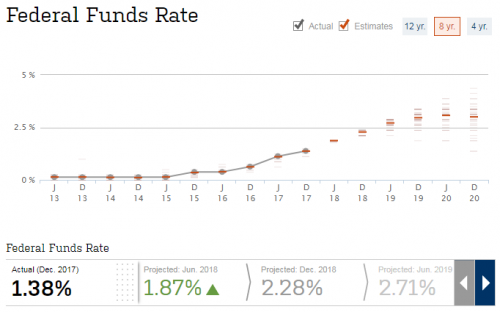Seguimos con lo mismo, fechar la siguiente recesión…
The second-longest economic expansion in US history will most likely end in 2020 as the Fed raises interest rates to cool off an overheating economy, reports the Wall Street Journal which surveyed 76 forecasters.
Some 59% of private-sector economists surveyed in recent days said the expansion was most likely to end in 2020. An additional 22% selected 2021, and smaller camps predicted the next recession would arrive next year, in 2022 or at some unspecified later date. -WSJ
“The current economic expansion is getting long in the tooth by historical standards, and more late-cycle signs are emerging,” said Bank of the West's chief economist Scott Anderson, chief economist, who thinks a 2020 recession is likely.
As for the cause - 62% of forecasters said that an overheating economy would lead to Fed tightening, while other economists (at least 5%) said that another financial crisis, bubble bursting or disruptions to international trade would be the culprits.
Recessions are notoriously difficult to predict, and sometimes are tricky to recognize even after they start. The recession that began in December 2007 wasn’t officially proclaimed by the National Bureau of Economic Research’s recession-dating committee until a year had gone by. Forecasters saw the chances of a recession rise back in 2011 and in 2016; both turned out to be false alarms. -WSJ
“Recessions occur because of unforeseen shocks, so by definition there is no meaningful answer,” said Daniel Bachman - an economist with Deloitte who declined to estimate either the timing or cause of the next downturn.
The takeaway: while a recession isn't imminent, the economy won't expand forever - and the next downturn may arrive during the 2020 presidential campaign.
“Any year from 2019 onward is in play,” Lou Crandall, chief economist at Wrightson ICAP told the Journal.
On average, economists predicted gross domestic product will expand 2.9% in the fourth quarter of 2018 compared with a year earlier, up from 2.6% growth in 2017. The unemployment rate, which fell to 3.9% in April, was expected to slide further to 3.7% by the end of this year and 3.6% by mid-2019. The average risk of a recession in the next 12 months was pegged at 15%. -WSJ
The forecasters also predicted that the unemployment would rise slightly going into the next election, and that the Fed Funds rate would top 3%.
One positive note: Economists think that sluggish US productivity should pick up over the next few years.
Labor-productivity gains averaged just 1.2% a year in 2007 through 2017, according to the Labor Department, a weak trend that threatens to restrain the pace of economic growth. After remaining flat in 2016, nonfarm business labor productivity rose 1.3% in 2017, and economists on average predicted annual growth will average 1.5% over the next five years. -WSJ
“More capital investment should help revive productivity,” said Lynn Reaser of Point Loma Nazarene University.
In fact, 71% of economists say there's a good chance that productivity growth will exceed forecasts rather than disappoint.
Tax cuts
While Trump's corporate and personal tax cuts provided a boost to the economy, most of the surveyed professionals said that it isn't the sole explanation for the recent surge in US business investment. Most said that the tax-code changes were one of several major causes - with only 5% attributing the cuts to the primary driver.
Abrazos,
PD1: De nuevo el Papa lo clava. Frente a las continuas críticas al clero, mira que le gusta a los españoles criticar a los curas…, pues dice justo lo contrario, que les ayudemos, que recemos por ellos, que les demos conversación y apoyo…:
El sacerdote de tu parroquia está siempre a tu disposición. Para dar la misa, visitar a un enfermo, hablar con quien no tiene quien le escuche y un montón de cosas más, dice el Papa Francisco.
Pero no es un superhombre. Es una persona que, como todos, también se siente a veces solo. En esos momentos de soledad tu puedes hacer mucho por él. Escúchale, visítale, sonríele. Lo necesita.
El cansancio de los sacerdotes... ¿Saben cuántas veces pienso en él? Los sacerdotes, con sus virtudes y sus defectos, desarrollan su labor en tantos campos… De la catequesis a la liturgia, de la caridad a los compromisos pastorales e incluso administrativos.
Y ante tantos frentes abiertos no se pueden quedar parados después de una desilusión, rendirse ante las dificultades o dejarse vencer por su fragilidad. En esos momentos es bueno que recuerden que la gente quiere a sus pastores, los necesita y confía en ellos.
Recemos juntos para que los sacerdotes que viven con fatiga y en la soledad el trabajo pastoral se sientan ayudados y confortados por la amistad con el Señor y con los hermanos.






